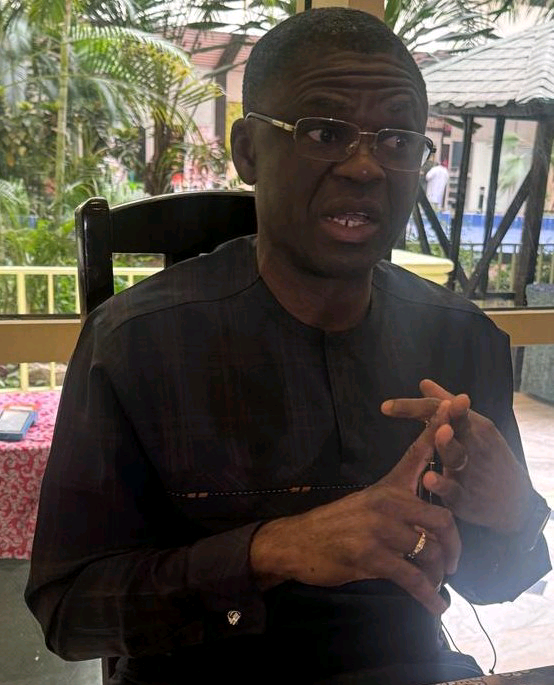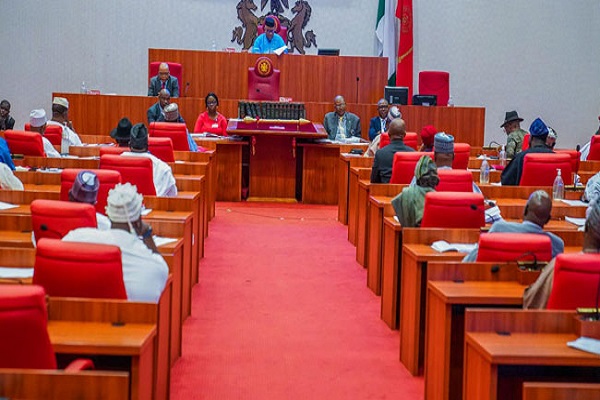News
Edo needs practical not experimental governance — Shaibu

Edo Deputy Governor, Philip Shaibu, says what the state needs is practical and not experimental governance.
Shaibu told newsmen on Sunday in Abuja, “with the 2024 Edo Governorship Election fast approaching, the state could not afford to experiment again with someone who does not understand the politics of the state or the needs of the people.
“Edo people need practical governance and you cannot experiment again with somebody that do not understand the politics of a good state and the needs of the people.”
According to the deputy governor, citizens across the globe are clamouring that the government should not be pushing for projects that are not needed in any environment.
Shaibu said, “So, everything we have to do should be assessed.
“You cannot know the need of the people when you don’t live with them. So for me, competence and experience should be the watchword as we go into election in 2024.
“Who is competent? Who is more experienced? Who will hit the ground running from day one?
“Are we going to experiment with a new person again? And the person will spend the first four years learning on the job and he will spend another four years trying to embezzle, set up his businesses in the name of consolidating on the gains of the first term.
“Or we need a governor that from the day one will hit the ground running?”
Shaibu, who had since indicated his interest in the Edo governorship race said that for any government to succeed, there must be collaboration between the state and the Federal Government.
He said, “From my own experience, I have seen that for me to succeed as a Governor, there must be collaboration.
“I understand the debt profile of the state and where I feel I can get funding to put up structure in the state. So, I won’t be coming to learn on the job, but to hit the ground running.”
The deputy governor said that the problem with the system in Edo was that there had been too many seminars, workshops and programnes, yet the outcomes had never been implemented .
“You see, the problem, what we have in the system is that we have too many seminars, too many workshops, too many programs and you don’t have time to implement their outcomes.”
Shaibu, who also spoke on rotational governorship among the three zones in the state, said, “there was not and had never been any convention in the state, either through political or traditional conferences where such position was zoned.”
He, however, said that he was an advocate of fairness and equity, adding “whoever talks about equity, must come with clean hands.
Shaibu added, “Whereas other senatorial districts have had more than one turn in the governorship position in the state, Edo North had only one turn.
“We have had four governors from South, two from Central and only one from North.
“Just like my ambition to be the deputy governor was not mine, but I made myself available, so also the ambition to be governor is still not mine. I’m only making myself available.”
Headline
Prince Harry visits sick Nigerian soldiers in Kaduna

Prince Harry and his team visited the 44 Nigerian Army Reference Hospital in Kaduna to interact with wounded soldiers who are receiving treatment.
The Duke of Sussex is in Nigeria with his wife to champion the Invictus Games, which Harry founded to aid the rehabilitation of wounded and sick servicemembers and veterans.
Nigeria joined the Invictus Community of Nations in 2022 becoming the first African country to join.
Prince Harry’s visit to Kaduna came 68 years after his late grandmother Queen Elizabeth II visited the state during the time of the late Premier of Northern Region Sir Ahmadu Bello.




News
Senate approves death penalty for drug traffickers

Senate on Thursday, May 9, approved the death penalty for those convicted on the charge of drug trafficking in the country.
The punishment prescribed in the extant NDLEA Act is a maximum sentence of life imprisonment.
The resolution of the Senate followed its consideration of a report of the Committees on Judiciary, Human Rights and Legal Matters and Drugs and Narcotics, National Drug Law Enforcement Agency (NDLEA) Act (Amendment) Bill, 2024.
The Chairman of the Committee on Judiciary, Human Rights & Legal Matters presented the report during plenary, Senator Mohammed Monguno (APC-Borno North).
The bill, which passed its third reading, aims to update the list of dangerous drugs, strengthen the operations of the NDLEA, review penalties, and empower the establishment of laboratories.
Section 11 of the current act prescribes that “any person who, without lawful authority; imports, manufactures, produces, processes, plants or grows the drugs popularly known as cocaine, LSD, heroin or any other similar drugs shall be guilty of an offence and liable on conviction to be sentenced to imprisonment for life” was amended to reflect a stiffer penalty of death.
Although the report did not recommend a death penalty for the offence, during consideration, Senator Ali Ndume moved that the life sentence should be upgraded to the death penalty.
During a clause-by-clause consideration of the Bill, Deputy Senate President Barau Jibrin, who presided over the session, put the amendment on the death penalty to a voice vote and ruled that the “ayes” had it.
But Senator Adams Oshiomhole objected to the ruling, saying that the “nays” had it.
He argued that matters of life and death should not be treated hurriedly, but Barau said it was too late, as he failed to call for division immediately after his ruling.
The bill was subsequently read for the third time and passed by the Senate.
-

 Headline2 days ago
Headline2 days agoSuspend cybersecurity levy– Reps to CBN
-

 Headline2 days ago
Headline2 days agoTinubu resumes work after foreign trip
-

 Business2 days ago
Business2 days agoNigeria needs over $2bn to revive Ajaokuta Steel Plant, says Minister
-

 Entertainment3 hours ago
Entertainment3 hours agoAMVCA Cultural Day: BBNaija’s Neo, Venita win Best Dressed Male, Female
-

 Metro3 hours ago
Metro3 hours agoEx-Sports Minister laments after hospital neglected him for hours over N80000 deposit
-

 Headline3 hours ago
Headline3 hours agoPrince Harry visits sick Nigerian soldiers in Kaduna
-

 News2 days ago
News2 days agoShan George’s money returned to Zenith Bank account









